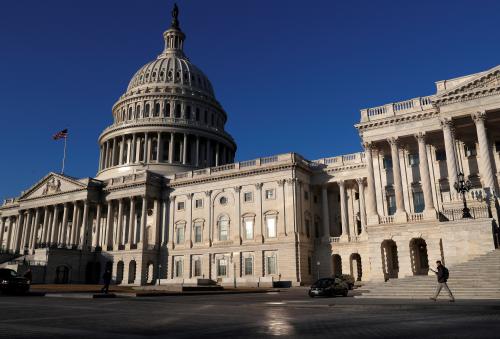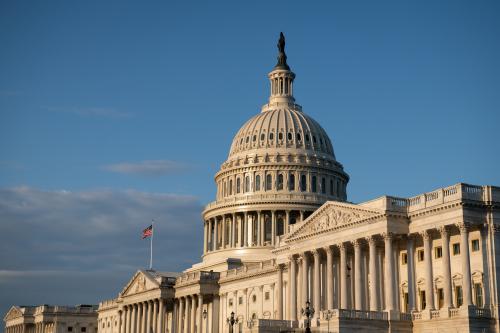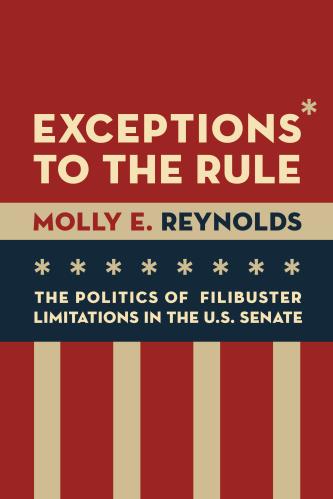With a series of votes today, the Senate “went nuclear,” reducing the number of votes needed to end debate on a Supreme Court nomination from 60 to 51. While he led today’s charge, Senate Majority Leader Mitch McConnell (R-Ky.) has committed to maintaining the current procedures for regular legislation. Should we believe him?
I’ve argued elsewhere that, when it’s to the electoral advantage of the majority party, the Senate will sometimes adopt special procedures that protect specific bills from filibusters. This happens despite the fact that doing so often requires the support of some members of the minority party because the procedures are created through the regular legislative process. Given that the nuclear option requires only a simple majority to implement, then, why wouldn’t the current Republican majority eliminate the filibuster for legislation? Republicans’ electoral chances should improve if they could adopt a set of policies that Senate Democrats will likely obstruct, right?
The current political landscape, however, suggests that the calculus is not this straightforward. As political scientist Frances Lee has argued, the contemporary Congress is characterized by tight competition for control of the chamber. This dynamic leads both the majority and minority parties to prioritize not only racking up legislative achievements but also creating situations in which their partisan opponents can be blamed for various outcomes. Making the other party look bad, in other words, can generate electoral benefits just like making your own party look good can.
What does this mean for the future of the filibuster? Given that Republicans control the House, Senate, and White House, they are under pressure to produce achievements rather than simply undercut their opponents. But given the intra-party divisions they face, consensus may be difficult to find on some issues. If there are situations where McConnell believes that the political gains from blaming Democrats for failure in the presence of a filibuster exceed those benefits Republicans would accrue from deploying the nuclear option and adopting a new policy favored by only a simple majority in the party, then he has little incentive to pull the trigger. We might expect this calculation to weigh especially heavily on McConnell’s mind since, as Alec MacGillis has argued, his leadership philosophy tends to emphasize winning political victories over substantive policy change.
The failure of the AHCA illustrates why retaining the ability to blame Democrats may prove especially useful to Republicans in the coming months. As my colleague Sarah Binder has argued, one consequence of Republicans’ choice to use the budget reconciliation process for their attempt to roll back parts of the Affordable Care Act is that the party assumed full responsibility for passing the bill. By opting for a procedural path that meant they needed no Democratic votes, Republicans made it basically impossible to blame Democrats for the bill’s failure. If the measure had made it to the Senate for consideration, we would have likely seen a replay of the House dynamic. Tensions between senators who felt the bill did not go far enough and those who were concerned about the consequences of the measure, especially its Medicaid provisions, would have meant more focus on the inability of Republicans to overcome their intra-party challenges. Adopting the kind of party line strategy that would become commonplace in a filibuster-less Senate only makes sense if your party is unified on what it wants.
McConnell has a history of using procedural maneuvers to shape the political blame-credit calculation to his advantage. In both 2011 and 2013, he negotiated a procedural path out of conflict over raising the debt ceiling. Rather than force members of his own party to have to cast a potentially unpopular vote, McConnell’s plan gave President Obama the power to request an increase to the debt limit. Congress would then have the opportunity, using a legislative vehicle that could not be filibustered, to disapprove of the president’s action. If the disapproval measure managed to pass both houses, it would go to the president for his certain veto, since the president strongly favored raising the limit. Given that it was unlikely that two-thirds of both chambers would vote to override such a veto, McConnell had engineered a procedural solution to a political problem. The debt limit would be increased, but those members of his caucus who wanted to be able to say they had voted against it would also be able to do so.
These face-saving benefits of the filibuster aren’t the only reason that it’s likely to stick around for legislation. Of likely equal importance is the fact that individual Republican senators often use the chamber’s rules to advance their own agendas and might be loath to give up that power. But as Republicans chart their legislative path forward, and Democrats craft their responses, both sides should anticipate that the filibuster will continue to affect how the upper chamber works.










Commentary
Filibuster: Republican friend or foe?
April 6, 2017